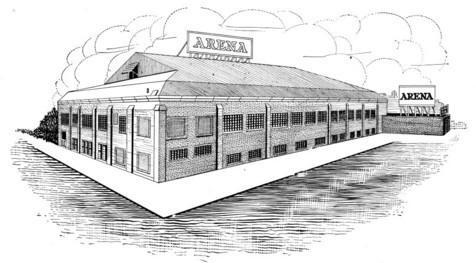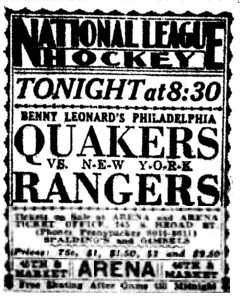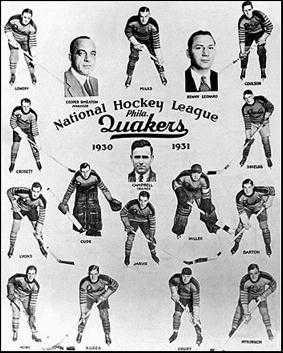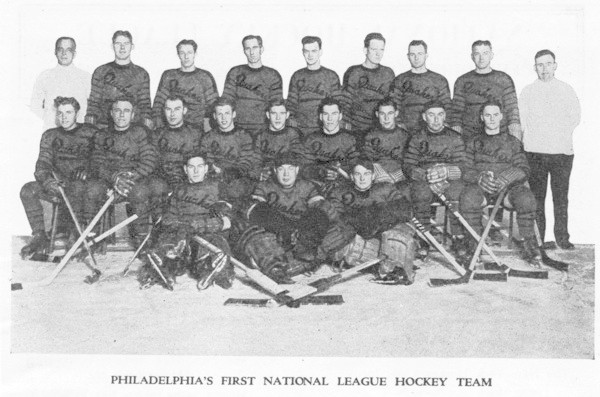 |
|
|||||||
 | ||||||||
|
 |
|
|||||||
 | ||||||||
|

|
Introduction by Paul Christman Philadelphia’s first National Hockey League franchise got its start in Pittsburgh. In 1925, the New York Americans and Pittsburgh Pirates became the NHL’s newest members. The league had first entered the United States only the year before, when the Boston Bruins were born. The Pirates played at Pittsburgh’s Duquesne Garden, first erected as a trolley barn in 1890 and converted into an arena seating about 5,000 six years later. Even though the Pirates made the playoffs in 1926 and 1928 (barely, with late-season surges), the city’s hockey fans never warmed up to them. Pittsburgh was a good hockey town, but the middle-of-the-pack Pirates had to compete with memories of the popular Pittsburgh Yellow Jackets. Helped by several future Pirates, the Yellow Jackets had won the U.S. Amateur Hockey Association championship in 1924 and 1925. The Pirates almost never sold out at the tiny Garden, and some of their home games were played at their opponent’s rink or a neutral site to rake in a bigger gate. Pittsburgh drew a league-low 40,000 fans to their home games in 1927-28 (Ottawa, attracting almost 100,000, was second worst). Rumors that the Pirates would be relocated to another city hounded the team as early as 1926. Philadelphia and Cleveland headed the list of future homes. Talk of a transfer intensified when team owner Henry Townsend died in January 1927. It was said in the press that Townsend had known little about hockey. But his family held onto the Pirates until October 1928, when ex-boxer Benny Leonard reportedly headed a group that purchased the franchise. Leonard announced, “I think I can make professional hockey pay in Pittsburgh.” He added, “We plan a number of deals to strengthen the outfit.” Leonard had retired from boxing in 1925 as perhaps the greatest lightweight boxing champion of all time. He knew boxing but his knowledge of hockey proved to be no threat to Conn Smythe or Lester Patrick. Several modern sources now say that after the Townsends sold the Pirates in 1928, the team was purchased not by Leonard, but by William V. “Big Bill” Dwyer, a bootlegger. Dwyer, who already owned the New York Americans, kept news of his hand in the sale of the Pirates away from the press. In a 1975 interview with Robert Fachet of the Washington Post, Quaker forward Syd Howe said Leonard was the team’s general manager. From what Howe told Fachet, Dwyer’s ownership was no secret to the players: “The team was owned by Dwyer … at least that’s what we were led to understand.” Leonard got off to a stormy start in Pittsburgh. He and the Pirates’ star goalie, Roy “Shrimp” Worters, got into a bitter salary dispute. Eventually, after much acrimony and league intervention, Worters wound up with Dwyer’s Americans. In return, Leonard received $20,000 and Joe Miller, a competent goalie but hardly on a par with Worters. Under Leonard, the Pirates headed steadily downhill. The team won just nine games in 1928-29 and finished 21 points out of a playoff spot. Things only got worse in 1929-30. The Pirates went 5-36-3, and at season’s end stories that the team was headed elsewhere finally became true. After a final rumor that the Pirates would be transferred to Atlantic City until a suitable arena in Cleveland could be built, the team made its way to Philadelphia in October 1930. But the franchise’s situation was still unsettled. At first, it was said the team would return to Pittsburgh if an acceptable arena were constructed there. Philadelphia and Cleveland would get expansion franchises in a 12-team NHL to come in the next year or two. This hot-stove league chatter was short-lived. As Great Depression deepened, the NHL had to consider trimming its deadwood, not branching out. Yet, Leonard talked as though he had come to Philadelphia to stay. The team, now renamed the Philadelphia Quakers, skated at the inadequate Philadelphia Arena at 45th and Market Streets. The Arena was only 10 years old. But it could seat only 6,000 fans, had poor sightlines, and was outclassed by the newer, larger rinks that housed the other NHL teams. Leonard told the Philadelphia press that his players would improve now that they had an iron-fisted new coach in Cooper Smeaton. Just after the Quakers were born, Smeaton had stepped down as NHL referee-in-chief to try managing the new team. Hockey writers were quick to point out that while the Pirates had executed a change of city, team name, coach, and uniform, the team was still at the bottom of the NHL barrel. Ten days into the season, Leonard Cohen of the New York Post wrote, “The Philly hosts look like the weakest force in the circuit on paper; they’re every bit of that on the ice.” Still, Leonard talked a good game. He told the local press, “We must make a good start and I will spare no expense to give the fans what they want. We have other deals in mind which will be consumed if the men we have now fail to deliver.” He stood behind the players he had in training camp, saying, “Once you see them in action, you will say they have the goods.” He said he intended to train the players himself and proclaimed, “I feel certain Philadelphia hockey fans will like the men who will represent this city in the National League. I want to produce a winning club. If I don’t, it won’t be my fault.” Coach Smeaton, Leonard said, knew the game “from A to Z.” Perhaps that’s why Smeaton was more cautious. Before the season started, he told the Philadelphia writers, “I know there are better teams than the Quakers in the league, but we are going to have a fighting combination.” Although the Quakers fulflled Smeaton’s prediction as fighters, it’s not likely that anyone could have predicted the Quakers would take the 5-36-3 record of the 1929-30 Pirates a step lower. The Quakers played their first game on November 11, 1930. It was a home contest versus the New York Rangers. The ushers were dressed in tuxedos. Colorful flags were hung from the Arena’s ceiling. The Quakers emerged in new uniforms that preserved the orange and black colors of the 1929-30 Pirates, who had dropped the yellow and black they had worn before. But the Rangers won 3-0. As the game wore on, Stanley Woodward of the New York Herald Tribune wrote, the Philadelphia crowd of 4,000 to 5,000 began to make “caustic remarks.” Many fans left the Arena in the final period. Only 2,000 appeared for the second Quakers home game a week later. The Quakers got off to a disappointing 1-4-1 start. They were unable to even score a goal until their third game. But to everyone’s surprise, the Quakers beat Toronto 2-1 in their sixth contest, played at the Philadelphia Arena November 25. The win ended the Maple Leaf streak of five straight shutouts to open the season and briefly raised the hopes of a few Philadelphians. However, as Bert Perry of the Toronto Globe revealed a few months later, the Leafs had been overconfident, taking it easy for two periods. When the Leafs suddenly found themselves down 2-1 at the start of the third, they launched a comeback try. Joe Miller’s goaltending was the key factor in holding Toronto off. Unfortunately, the Quakers had little chance to celebrate. For the next month and a half, it must have seemed as though none of the Quakers’ opponents would take them too lightly again. The Quakers did nothing but lose from November 25 until January 10, when they managed to edge the Montreal Maroons 4-3 in overtime. That win ended a streak of 15 consecutive Quaker defeats, then an NHL record. It was a record that stood for over 44 years. The 1974-75 Washington Capitals finally topped it by losing 17 straight. Leonard and Smeaton worked to blend in some younger players once the losses started to mount up. But little changed throughout the long season. On average, Smeaton’s crew could scrape together only a win and a tie each month. The Quakers found themselves losers at the Arena box office to the minor league Philadelphia Arrows, a fourth-place team that would finish out of the Canadian-American Hockey League playoffs. Quaker crowds averaged a mere 2,500. By January 1931, Leonard had to fend off rumors that the Quakers would be moved to another city. Benny quietly withdrew from the Quaker picture after that, and he later made an ill-advised comeback to boxing to recover some of his financial losses. As for the Quakers, their final 4-36-4 record, for a .136 winning percentage, today ranks as the second-worst pace in NHL history. Only the 1974-75 Washington Capitals, who won at a .131 clip, have fared worse. On September 26, 1931, the NHL suspended the Quakers franchise for one year. Despite talk of reviving the team, usually with Pittsburgh in mind, the league suspended the franchise again and again until it was formally killed off at last in 1936. Perhaps the only Quaker player to taste success was forward Syd Howe, who was elected to the Hall of Fame in 1965. Though the Quakers had several other decent players, no one missed the team after its demise. The other NHL teams had wearied of the smaller attendances the Quakers practically guaranteed in their rinks, and Philadelphia was not left without hockey. The city was represented by the Arrows and several other minor league teams that came in their wake until the Flyers came to town in 1967. BOOK Paul Christman has already written much about the Quakers for a possible book. Although newspapers from the 1930s have yielded much information on Philadelphia’s first NHL team, it takes more to write a team history. Do you have any information on the Quakers (or the Pirates) that you’d like to share? Stories that have passed down, photographs, game programs, or anything else? Whatever that you have to tell, or even items you’d like to sell, would be appreciated and acknowledged. Or, do you just want more information of any kind on the Quakers or Pirates? Whatever you want to share or want to know, contact Paul at paul.christman@wolterskluwer.com. |
 |
|

|

|
|
Inquirer ads for the first Quakers games (courtesy Paul Christman) |
|

| Date | Road | Home | ||||
| 11-Nov-30 | Rangers | 3 | @ | Quakers | 0 | Boxscore |
| 15-Nov-30 | Quakers | 0 | @ | Toronto | 4 | Boxscore |
| 16-Nov-30 | Quakers | 1 | @ | Detroit | 5 | Boxscore |
| 18-Nov-30 | Ottawa | 2 | @ | Quakers | 2 (ot) | Boxscore |
| 23-Nov-30 | Quakers | 2 | @ | Rangers | 5 | Boxscore |
| 25-Nov-30 | Toronto | 1 | @ | Quakers | 2 | Boxscore |
| 29-Nov-30 | Rangers | 6 | @ | Quakers | 3 | Boxscore |
| 2-Dec-30 | Canadiens | 2 | @ | Quakers | 0 | Boxscore |
| 4-Dec-30 | Quakers | 2 | @ | Ottawa | 5 | Boxscore |
| 6-Dec-30 | Boston | 4 | @ | Quakers | 3 | Boxscore |
| 9-Dec-30 | Americans | 2 | @ | Quakers | 1 (ot) | Boxscore |
| 13-Dec-30 | Detroit | 3 | @ | Quakers | 2 | Boxscore |
| 16-Dec-30 | Quakers | 0 | @ | Americans | 3 | Boxscore |
| 20-Dec-30 | Quakers | 1 | @ | Montreal | 5 | Boxscore |
| 23-Dec-30 | Chicago | 3 | @ | Quakers | 2 | Boxscore |
| 25-Dec-30 | Quakers | 0 | @ | Boston | 8 | Boxscore |
| 28-Dec-30 | Quakers | 2 | @ | Rangers | 4 | Boxscore |
| 1-Jan-31 | Quakers | 3 | @ | Chicago | 10 | Boxscore |
| 3-Jan-31 | Ottawa | 5 | @ | Quakers | 4 (ot) | Boxscore |
| 4-Jan-31 | Quakers | 0 | @ | Americans | 5 | Boxscore |
| 8-Jan-31 | Chicago | 4 | @ | Quakers | 0 | Boxscore |
| 10-Jan-31 | Montreal | 3 | @ | Quakers | 4 (ot) | Boxscore |
| 13-Jan-31 | Canadiens | 2 | @ | Quakers | 1 | Boxscore |
| 17-Jan-31 | Detroit | 5 | @ | Quakers | 2 | Boxscore |
| 20-Jan-31 | Quakers | 2 | @ | Detroit | 5 | Boxscore |
| 22-Jan-31 | Quakers | 2 | @ | Chicago | 5 | Boxscore |
| 24-Jan-31 | Boston | 4 | @ | Quakers | 2 | Boxscore |
| 27-Jan-31 | Quakers | 3 | @ | Boston | 3 (ot) | Boxscore |
| 29-Jan-31 | Quakers | 1 | @ | Canadiens | 7 | Boxscore |
| 31-Jan-31 | Quakers | 2 | @ | Toronto | 3 | Boxscore |
| 5-Feb-31 | Quakers | 1 | @ | Chicago | 6 | Boxscore |
| 10-Feb-31 | Rangers | 3 | @ | Quakers | 1 | Boxscore |
| 14-Feb-31 | Americans | 1 | @ | Quakers | 1 (ot) | Boxscore |
| 17-Feb-31 | Quakers | 2 | @ | Detroit | 0 | Boxscore |
| 22-Feb-31 | Quakers | 1 | @ | Rangers | 6 | Boxscore |
| 24-Feb-31 | Boston | 5 | @ | Quakers | 1 | Boxscore |
| 28-Feb-31 | Quakers | 1 | @ | Montreal | 4 | Boxscore |
| 3-Mar-31 | Toronto | 5 | @ | Quakers | 1 | Boxscore |
| 7-Mar-31 | Quakers | 2 | @ | Boston | 7 | Boxscore |
| 10-Mar-31 | Quakers | 3 | @ | Ottawa | 5 (ot) | Boxscore |
| 12-Mar-31 | Detroit | 5 | @ | Quakers | 7 | Boxscore |
| 14-Mar-31 | Montreal | 3 | @ | Quakers | 2 | Boxscore |
| 17-Mar-31 | Chicago | 4 | @ | Quakers | 0 | Boxscore |
| 21-Mar-31 | Quakers | 4 | @ | Canadiens | 4 (ot) | Boxscore |
Key Personnel |
||||||||||||||||||||||||||||||||||||||||||||||||||||||||||
|
||||||||||||||||||||||||||||||||||||||||||||||||||||||||||
W-L-T Record |
||||||||||||||||||||||||||||||||||||||||||||||||||||||||||
|
||||||||||||||||||||||||||||||||||||||||||||||||||||||||||
Playoff Games |
||||||||||||||||||||||||||||||||||||||||||||||||||||||||||
| -none- | ||||||||||||||||||||||||||||||||||||||||||||||||||||||||||
Leaders |
||||||||||||||||||||||||||||||||||||||||||||||||||||||||||
|
||||||||||||||||||||||||||||||||||||||||||||||||||||||||||
Scoring Stats |
||||||||||||||||||||||||||||||||||||||||||||||||||||||||||
|
Click on G,A or PIM for complete list or GP for game-by-game stats |
||||||||||||||||||||||||||||||||||||||||||||||||||||||||||
Goaltending Stats |
||||||||||||||||||||||||||||||||||||||||||||||||||||||||||
Click on GP for game-by-game stats |
||||||||||||||||||||||||||||||||||||||||||||||||||||||||||
Shutouts |
||||||||||||||||||||||||||||||||||||||||||||||||||||||||||
|
||||||||||||||||||||||||||||||||||||||||||||||||||||||||||
Opening Games |
||||||||||||||||||||||||||||||||||||||||||||||||||||||||||
|
||||||||||||||||||||||||||||||||||||||||||||||||||||||||||
Trades |
||||||||||||||||||||||||||||||||||||||||||||||||||||||||||
|
||||||||||||||||||||||||||||||||||||||||||||||||||||||||||
Other Transactions |
||||||||||||||||||||||||||||||||||||||||||||||||||||||||||
|
||||||||||||||||||||||||||||||||||||||||||||||||||||||||||
Injuries |
||||||||||||||||||||||||||||||||||||||||||||||||||||||||||
|
||||||||||||||||||||||||||||||||||||||||||||||||||||||||||

Back row: Cooper Smeaton (coach), Allen Shields, Rennison Manners, Rodger Smith, Tex White, Gord Fraser, Harold Darragh, Hib Milks, Archie Campbell (trainer)
Middle row: Aubrey Webster, John McKinnon, Tom Cowan, Syd Howe, Wally Kilrea, Bud Jarvis, Cliff Barton, Herb Drury, Gerry Lowrey
Front row: Andrew Spooner (?), Joe Miller, Wilf Cude